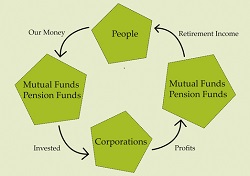|
People, Profits, & Pensions |
|
Google This!
Friday, January 31, 2014
You don't need Google Glasses to see this is a high-rolling stock, with a price now nearing $1,200 per share. It enjoyed a good run up this morning, rising nearly 4% while the Dow looked rather sickly. Count members of the Public Employees Retirement System of Ohio as being among the smiling. They own a big piece of Google (229,376 shares as of September 30, 2013), according to nasdaq.com. Also according to nasdaq.com, almost 85% of Google shares are owned by 1,706 institutional investors (mainly pension funds and mutual funds). After the market closed on Thursday, Google announced its fourth quarter and full 2013 financial results. Looking at its main business, ad sales, Google reported both good news and bad news; the number of clicks increased, but the revenue per click came down. "Paid Clicks - Aggregate paid clicks, which include clicks related to ads served on Google sites and the sites of our Network members, increased approximately 31% over the fourth quarter of 2012 and increased approximately 13% over the third quarter of 2013. "Cost-Per-Click - Average cost-per-click, which includes clicks related to ads served on Google sites and the sites of our Network members, decreased approximately 11% over the fourth quarter of 2012 and decreased approximately 2% over the third quarter of 2013." Google also announced a new class of shares. Here's how it was described by MarketWatch, "SAN FRANCISCO (MarketWatch) - Google Inc. (NASDAQ:GOOG) on Thursday said its board has approved the distribution of Class C shares that will trade under the ticker 'GOOG.' The Class C shares, which will have not voting power, will begin trading on April 3. The new class of shares was created by the company to give Google more options when it comes to compensation and acquisitions." Disclosure: some of the ads shown on this site originate with Google Adsense, making this site a Google Network member.
The Bigger Picture:Will Profits from Big Macs Add to Your Retirement Income?In 1948, the McDonald brothers redesigned and remodelled their drive-in restaurant in San Bernardino, California. Taking inspiration from Henry Ford's assembly-line, they created the fast food revolution, with the quick service and low prices we now take for granted. In that same year, the U.S. National Labor Relations Board ruled unions could include pension issues in contract negotiations. That ignited a massive expansion of pension plans. In the 1950s, pension funds started buying stocks, rather than just bonds or their equivalents; in addition mutual funds came of age. With these two developments working, middle class people became owners of big business. At first, their stakes were modest, but steadily growing. And in just a few decades, they gained controlling interests in many large corporations through their funds. Management guru Peter Drucker has called it, "...one of the most startling power shifts in economic history." Now, working people reap the benefits of those investments, collecting much of the profit distributed by McDonald's and other big corporations. Discover how the pieces fit together. In Big Macs & Our Pensions: Who Gets McDonald's Profits? - a new booklet -(about 25-pages), you will:
You may not be among the owners of McDonald's. But if you belong to any pension plan, or contribute to a mutual fund or whole life insurance policy, you likely own pieces of some big corporations. More importantly, though, your retirement income will be bigger and grow more dependably than you would otherwise expect. Big Macs & Our Pensions: Who Gets McDonald's Profits? is now available at Amazon.com
|

The Ownership Cycle
Copyright 2014. Robert F. Abbott, All Rights
Reserved.
|

 By: Robert F. Abbott, author of
By: Robert F. Abbott, author of